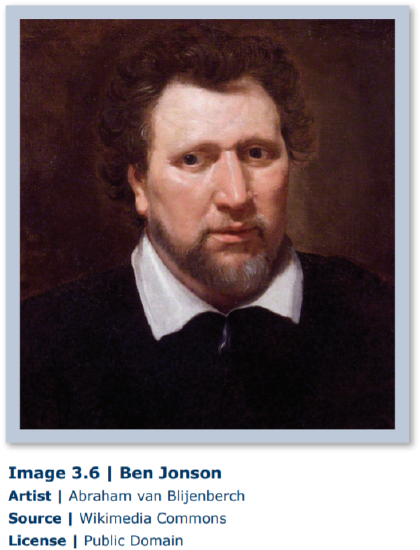5.6: Ben Jonson's "On My First Son" (1616)
- Page ID
- 104126
Ben Jonson was born probably around London, though some scholars believe he was born in Westminster. He was probably born in 1572, though that has been disputed, as well. Jonson himself specifies the day of his birth as the eleventh of June. He was a posthumous child, his father, a minister, having died a month before Jonson’s birth. His mother remarried a bricklayer, a trade to which Jonson was apprenticed but which he came to loathe. He was educated at the Royal College of St. Peter in Westminster where he studied grammar, rhetoric, Hebrew, and the Classics, including drama. He may have studied at Cambridge; he certainly participated in the English campaigns in the Netherlands. His proudest achievement during this campaign was his killing an enemy in single combat, and claiming the spoils of his defeated opponent.
He returned to London, and in 1594 married Anne Lewis. And he committed himself to a career in the theater, acting probably at Philip Henslowe’s (1550-1616) Rose Theatre and later for Henry Herbert, 2nd Earl of Pembroke’s (1538-1601) Men. He ultimately turned his talents to writing. Theaters were coming under Puritan attack, seen as places of corruption, scandal, and disease. Indeed, in 1597, Jonson was arrested and accused of performing in a seditious and scandalous play, The Isle of Dogs, but he was released within months. But Jonson’s work did much to elevate the prestige of theaters and of playwrights. And he actively saw to the publication of his plays in individual and collected form, thereby claiming their importance and his own as a writer. Jonson’s writing is noted for its adherence to classical models, its scholarship, wit, and style. The play he placed at the head of his collected Works was Every Man in His Humour, performed in 1598 by the Lord Chamberlain’s Men, a company that included Shakespeare.
 That same year, Jonson was arrested and tried for manslaughter. He pled guilty for having argued with and then having killed the actor Gabriel Spenser (1578-1598) in a duel. Jonson was branded with a hot iron and his goods were confiscated. He continued to write for the theater, though, including for Shakespeare’s Globe. He also wrote poetry, odes, and satires. For his art and livelihood, Jonson actively sought and won support from patrons that included Sir Robert Thownshend (1512-1556), a wealthy Parliamentarian, and Esme Stuart, 7th Seigneur d’Aubigny (1542- 1583), who was a cousin of James I. With Inigo Jones (1573-1652), James I’s architect, Jonson wrote several elaborate court masques. He eventually was awarded pensions from William Herbert, Earl of Pembroke (1580-1630), and James I.
That same year, Jonson was arrested and tried for manslaughter. He pled guilty for having argued with and then having killed the actor Gabriel Spenser (1578-1598) in a duel. Jonson was branded with a hot iron and his goods were confiscated. He continued to write for the theater, though, including for Shakespeare’s Globe. He also wrote poetry, odes, and satires. For his art and livelihood, Jonson actively sought and won support from patrons that included Sir Robert Thownshend (1512-1556), a wealthy Parliamentarian, and Esme Stuart, 7th Seigneur d’Aubigny (1542- 1583), who was a cousin of James I. With Inigo Jones (1573-1652), James I’s architect, Jonson wrote several elaborate court masques. He eventually was awarded pensions from William Herbert, Earl of Pembroke (1580-1630), and James I.
Jonson became a leader of the men of letters of his day. Such cavalier poets (Royalist poets) as Robert Herrick and Richard Lovelace (1617-1657) described themselves as the “Sons of Ben” and followed Jonson in adhering to classical forms, rules, and unities. Jonson was granted honorary degrees from both Oxford and Cambridge. He also helped prepare for publication the collected works of Shakespeare, the First Folio, in which appears Jonson’s poem “To the Memory of My Beloved, The Author, Master William Shakespeare, And What He Hath Left Us.” His work influenced not only his own time but also the future, particularly the Neoclassical Age. His classically-inspired art improves on nature that “first beget the imperfect” by proceeding “she to the perfect” (The Alchemist, II.iii.158, 159).
"On My First Son"
Please click the link to access this poem on Poetry Foundation's website.
Contributors and Attributions
Adapted from British Literature I - Middle Ages to the Eighteenth Century and Neoclassicism by Robinson and Getty. Sourced from LibreTexts , license: CC BY-SA


